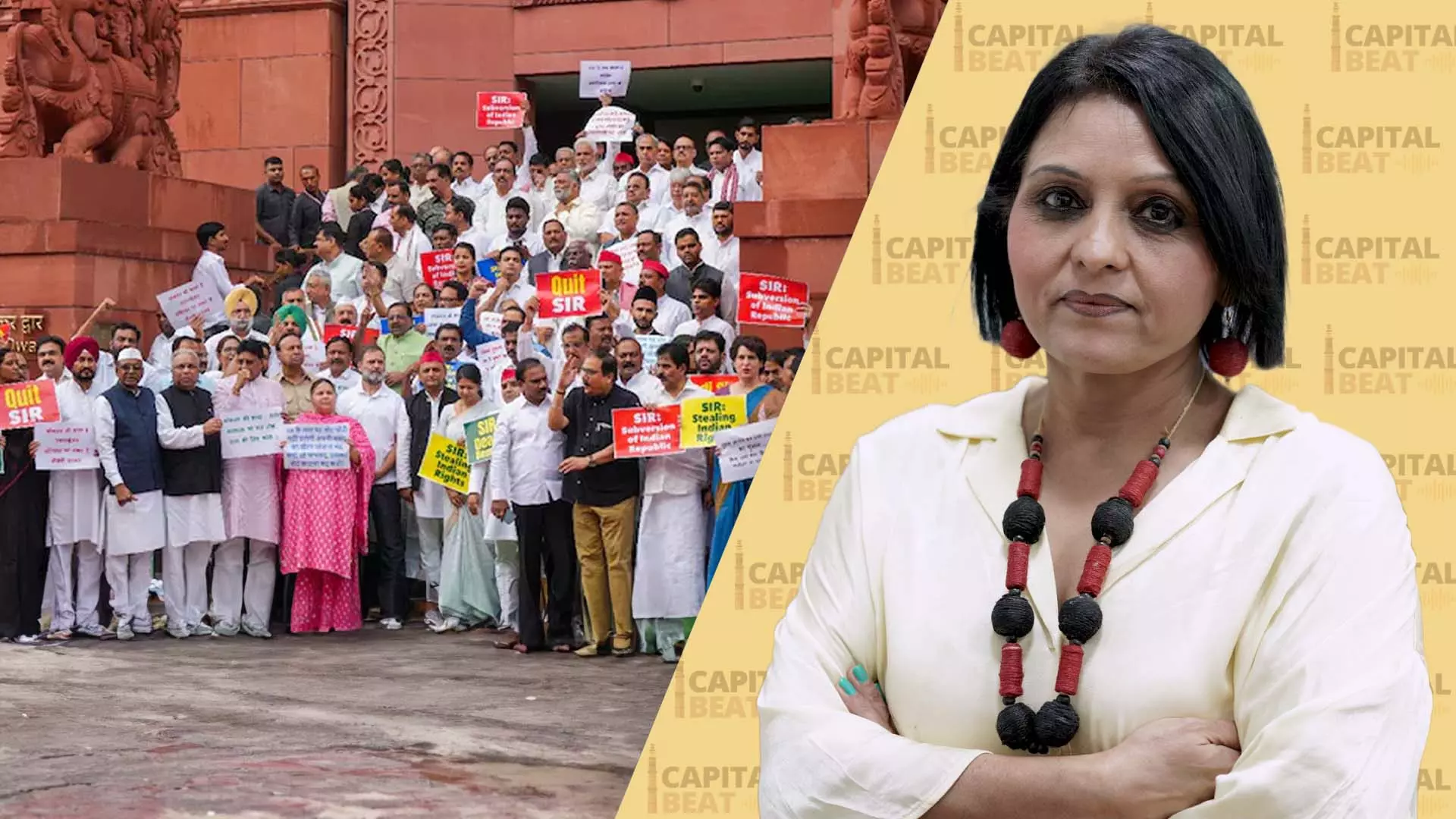
Chaos rules Bihar SIR; Opposition poll boycott in the offing? Capital Beat
Senior journalists Javed Ansari and Ashok Misra discuss political fallout of SIR, EC’s response, and what controversy could mean for upcoming Bihar elections

Protests over the Special Intensive Revision (SIR) of electoral rolls in Bihar took centre stage in Parliament and across the state, with opposition parties demanding a rollback of the process. As confusion intensifies on the ground and questions mount about the exclusion of genuine voters, The Federal’s Capital Beat featured senior journalists Javed Ansari and Ashok Misra, who discussed the political fallout, the Election Commission’s response, and what the controversy could mean for the upcoming Bihar elections and beyond.
The EC questioned its critics in a post that linked the Opposition to the SIR with potential support for fake voting. The EC's communication argued that the clean-up of electoral rolls is constitutionally mandated and essential for free and fair elections. It further clarified that voters who are alive, genuine, and eligible—even if living outside Bihar—would not be deleted from the rolls.
Clarifications, operational updates
The Chief Electoral Officer (CEO) of Bihar issued a clarification regarding the operational window for appeals. As per the EC’s SIR order, electors and recognised political parties have time from August 1 to September 1 to file claims and objections. This includes applications to include names left out or exclude those wrongly added by Booth Level Officers (BLOs) or Booth Level Agents (BLAs).
Also read: Monsoon session, Day 4: Another day, same washout story
Despite these assurances, reports indicate widespread confusion among voters and officials. Applicants checking the EC website reportedly receive automated responses to contact BLOs without further clarity. Concerns persist about the status of submitted forms and potential disenfranchisement of voters without proper documentation, particularly among backward and marginalised communities.
According to EC data, 18 lakh voters have been marked deceased, and 36 lakh have been identified with duplicate voter IDs. The total number of voters under scrutiny is around 50 lakh.
Political response, protests
Opposition parties raised the issue in Parliament and in the Bihar Assembly. They have also carried out street protests. Legislators wore black clothing in the Assembly as a mark of protest. The issue has caused repeated disruptions in legislative proceedings.
Voices within the ruling Janata Dal (United) expressed concern about the impact of the SIR process on migrant workers and families with members residing abroad. However, senior leadership of the party maintained that eligible voters will not be deleted if proper verification is completed.
Also read: Bihar SIR: Public hearing exposes citizens’ hardships; panel criticises EC
In response to queries raised in the Bihar Assembly, a senior minister stated that no names of genuine voters would be struck from the rolls and that the process is transparent. The EC has reiterated that the SIR process is governed by strict guidelines and allows for corrections.
Looming boycott threat
The Opposition bloc raised the possibility of boycotting upcoming elections in protest against the SIR exercise. The idea of a coordinated electoral boycott has been discussed within INDIA Bloc, though no formal consensus has emerged. Leaders have indicated that any such step would require agreement across parties and states, not just in Bihar.
Statements from alliance members suggest that while there is agreement on the gravity of the issue, final decisions on a boycott may hinge on the outcome of the Supreme Court hearing scheduled for July 28.
One panellist noted: “Unless there is pressure from the ground, nothing will move, not even the courts.”
Also read: Bihar SIR: EC defends voter deletions amid SC scrutiny; what next?
Electoral uncertainty, strategic risks
The SIR exercise has triggered debate on its potential to reshape voter demographics and impact election outcomes. Questions have emerged about the timeline of the process and whether eligible voters—especially those without documents or living outside Bihar—will be unfairly excluded.
Opposition parties are weighing the risks of boycotting elections against the consequences of contesting under a process they claim is flawed. Internal deliberations continue, with concerns about giving the ruling coalition an uncontested advantage if elections proceed without the participation of major opposition parties.
Another panellist observed: “The names of lakhs of voters are being removed. This could upend the entire political calculus.”
Watch | Bihar electoral roll anomalies: 11,000 voters ‘not traceable’? | Interview
The final decision on a boycott and further protest action may depend on the Supreme Court’s direction, as well as the political consensus within the INDIA Bloc. For now, the electoral outlook in Bihar remains uncertain, with voters, officials, and political parties awaiting clarity.
The content above has been transcribed from video using a fine-tuned AI model. To ensure accuracy, quality, and editorial integrity, we employ a Human-In-The-Loop (HITL) process. While AI assists in creating the initial draft, our experienced editorial team carefully reviews, edits, and refines the content before publication. At The Federal, we combine the efficiency of AI with the expertise of human editors to deliver reliable and insightful journalism.

